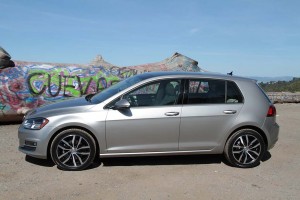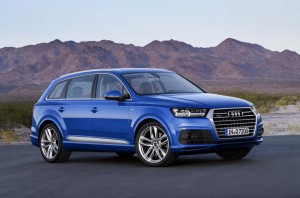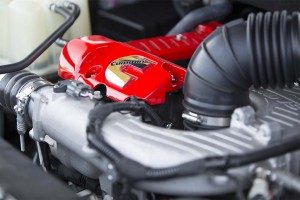They once accounted for nearly a quarter of the German automaker’s U.S. sales, but going forward, Volkswagen will no longer offer diesels in the U.S. market, according to brand chief Herbert Diess.
As the largest retailer of diesel-powered passenger vehicles in the U.S., VW helped spur a surge of offerings by competitors such as General Motors and Nissan, as well as Mercedes-Benz and BMW. But with diesel sales already on the decline, some analysts question whether VW’s decision will spur other automakers to abandon their “oil-burners,” as well.
“At the moment we assume that we will offer no new diesel vehicles in the U.S,” Diess told the German business daily Handelsblatt in an interview following the Tuesday announcement of the maker’s global turnaround plan.
(U.S. market critical to VW’s long-term future, says Diess. Click Here for more on its turnaround plan.)
That decision came as something of a surprise to observers considering the large share of VW’s U.S. sales that were made up of diesels. In 2014, VW sold 79,422 of its TDI models, or 21.6% of its total American volume.
VW’s diesel sales came to an abrupt halt in September 2015, the EPA barring their sale until the company could come up with an acceptable fix bringing them into compliance with American emissions mandates. But as recently as recently as last week, VW officials had left the door open to eventually returning the TDI to the U.S. line-up.
During a news conference at the maker’s headquarters in Wolfsburg, Germany, Diess said VW is intent on reviving U.S. sales that have tumbled sharply since the company admitted cheating on diesel emissions tests in September 2015. But the company appears ready to find alternatives to its TDI line-up. That will include not only higher-efficiency gasoline models but an assortment of electrified products such as the little I.D. battery-car unveiled at the Paris Motor Show earlier this year.
That’s in line with comments made by Hinrich Woebcken, CEO of the Volkswagen Group of America, at the Los Angeles Auto Show last week. He told reporters that, with U.S. emissions standards getting tougher and tougher, “Why don’t you put the money on the spot where the future is?”
(VW cutting 30,000 jobs worldwide in wake of diesel scandal. Click Here for the story.)
While the VW brand will no longer market the TDI, sibling marque Audi could continue to offer a more limited diesel option.
“Once we hopefully get past everything, I see an opportunity for potentially, probably to offer it on one model, and that model would probably be the Q7 SUV,” Audi of America President Scott Keogh said in an interview with the Reuters news service.
VW’s strong diesel sales helped convince competitors to return to a market segment that had largely been abandoned three decades ago. Diesels had become a popular option in the wake of the twin oil shocks of the 1970s. But they were slow, rough-riding and foul-smelling, and by the end of the 1980s, diesels had vanished from U.S. showrooms.
VW brought oil-burners back with the launch of the TDI family, promising they would be not only fuel-efficient but quick, smooth and clean. As sales took off, German competitors like Mercedes and BMW added diesels to their line-up, while GM and Fiat Chrysler followed suit. Even Nissan weighed in last year with the launch of a diesel-powered version of the redesigned Titan pickup.
But, in the wake of the revelations about VW’s emissions test scam, demand fell off the cliff. In January of this year, Americans bought a grand total of 222 diesel passenger cars and light trucks, down from about 4,500 during the same month a year before.
Even before the VW scandal erupted, demand was on the decline. Diesel sales hit a recent peak of 490,000 in the U.S., according to Statista.com. But demand diesel-powered passenger vehicles – including non-commercial sales of passenger cars, utility vehicles, vans and pickups – slumped to just 155,000 last year, according to trade group the Diesel Technology Forum.
“It’s hard to determine how much of that was the result of declining interest in diesels and how much was a direct reaction to the VW problem,” said Stephanie Brinley, a senior analyst with IHS Automotive.
Brinley said it is quite possible VW’s announcement, along with the broader decline in the U.S. diesel market could lead other manufacturers to rethink the need to offer the high-mileage technology – especially with new battery-based options set to flood the market.
It hasn’t helped that the EPA, in the wake of the VW scandal, has cracked down on emissions testing, at least temporarily holding up approval for a number of new diesel models.
That said, don’t write off U.S. diesels entirely, at least not just yet. As TheDetroitBureau.com reported last week, Mazda is finally getting ready to launch its own SkyActiv diesel engine in the U.S. And there seems to be enough demand in the pickup segment that some makers, notably Nissan and Fiat Chrysler’s Ram brand, could continue to offer diesel options.
But where many observers were, barely two years ago, predicting a major diesel renaissance in the U.S., such optimistic expectations seem clearly to have been dashed.
(Mazda to introduce diesel option on new CX-5 crossover. Click Here for more.)




I wonder how long the no-diesel policy will last, given the high percentage of diesels (all brands, not just VW) in other markets. Will the US just be their odd-man-out? Or will Mazda’s CX-5 and Chevy’s promised Cruze diesel, both for 2018, change their mind if they sell well. And, I’d guess, take some traditional VW customers.